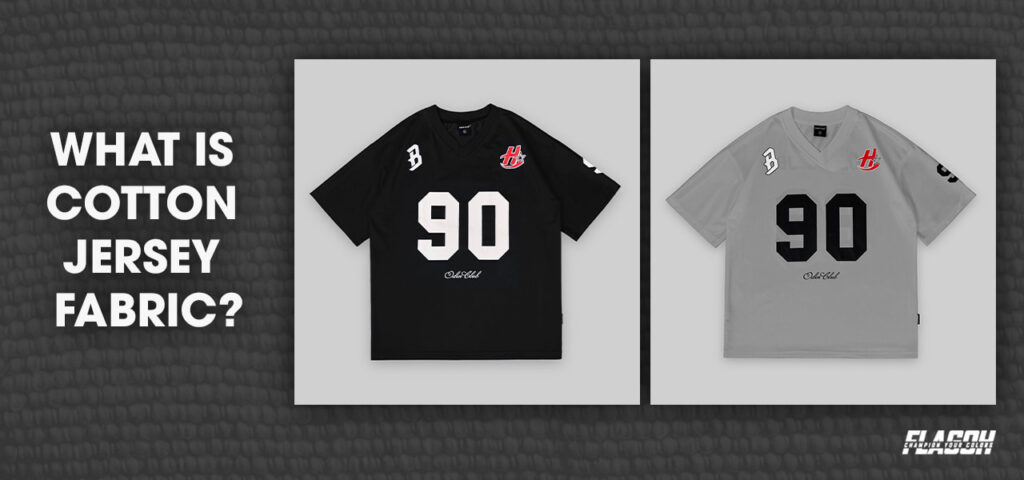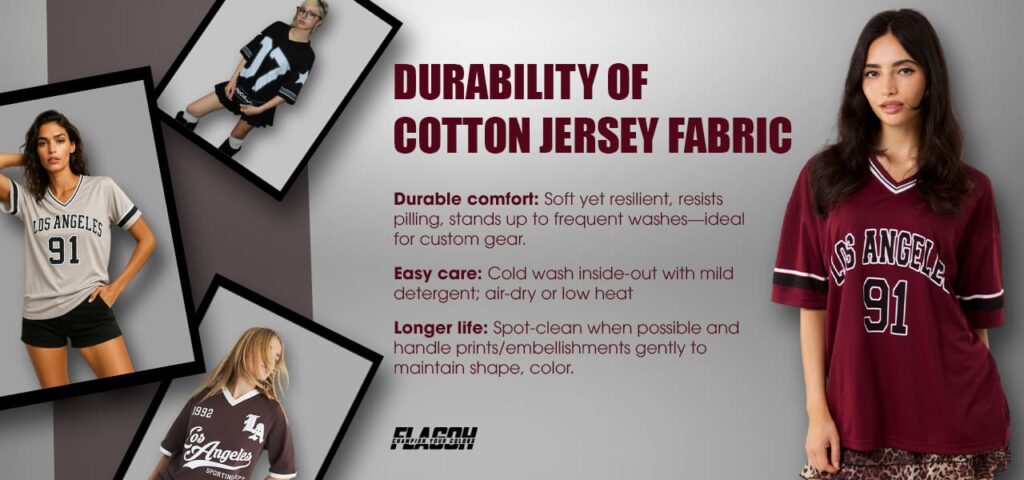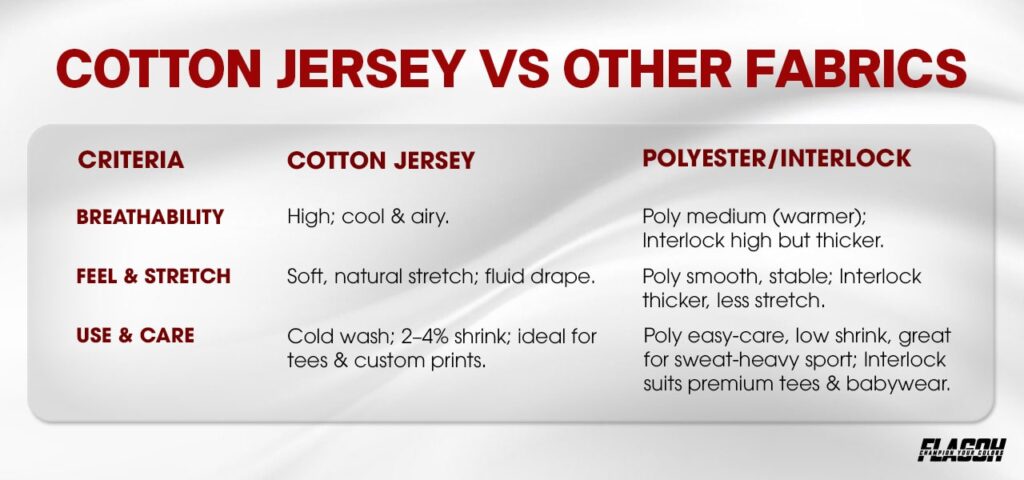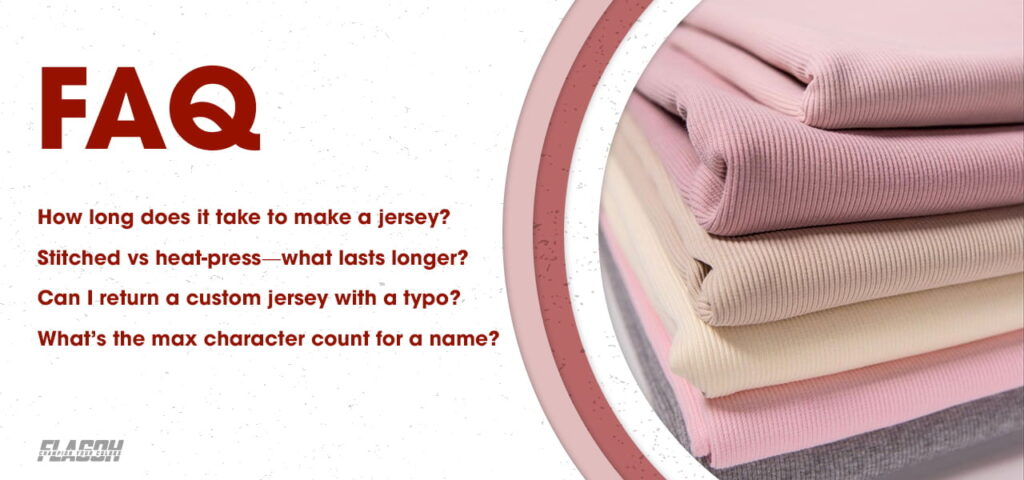News
What Is Cotton Jersey Fabric? Benefits & Uses | FlagOh
Cotton jersey fabric is a go-to for custom apparel thanks to a balanced mix of comfort, durability, and breathability—ideal for everything from casual tees to performance jerseys. In this FlagOh guide, we’ll dive into what cotton jersey is, why it’s great for custom apparel, and how it stacks up against other fabrics.
What is Cotton Jersey Fabric?
Cotton jersey fabric is a single-jersey knit made from cotton yarns. Its weft-knit loop structure provides natural stretch and reliable recovery, a smooth surface with a soft hand, and fluid drape. Naturally breathable, it’s ideal for warmer climates, T-shirts, and athleisure/activewear. Typical weights run 140–200 GSM. Because it’s a single-jersey knit, raw edges tend to curl—proper finishing (hems, bindings) keeps edges flat and clean.

How is cotton jersey knit fabric made?
Cotton jersey is produced by interlooping cotton yarns on circular knitting machines to form a single-jersey structure with inherent stretch and a smooth face. This method results in a fabric with a slight stretch, giving it a classic jersey face and back. The fabric is usually created using a circular knitting machine, which allows it to have a continuous, seamless design. The structure of the fabric allows it to have a smooth surface with minimal wrinkles, making it easy to care for and maintain.
What Makes Cotton Single Jersey Unique?
What sets cotton jersey apart from other fabrics is its knitting technique, which gives it a natural elasticity and drape. The fabric’s “jersey” structure refers to the way the cotton yarns are looped and interwoven, creating a soft, flexible texture that moves with the body. This unique structure makes cotton jersey an excellent choice for apparel that needs to move and stretch, such as sports jerseys or fitted clothing.
Advantages of Cotton Jersey Material Over Other Fabrics
One of the standout benefits of cotton jersey is its combination of comfort, stretch, and durability. Unlike woven fabrics, which tend to be more rigid, cotton jersey can stretch and recover its shape, making it perfect for activewear and everyday clothing. Moreover, it’s a natural fabric, making it more breathable and skin-friendly compared to synthetic materials like polyester. The fabric’s ability to hold prints and embroidery also makes it a go-to choice for custom apparel, from personalized sports jerseys to fashion-forward t-shirts.
Why Cotton Jersey Fabric is Ideal for Custom Apparel
Cotton jersey balances comfort, stretch, and everyday toughness—ideal for tees, team tops, promos, and lifestyle drops. Whether you’re designing T-shirts, sports jerseys, or promotional wear, its soft hand, breathability, and ability to hold vibrant prints make it an ideal base for bringing your creative designs to life.
Why It’s Highly Breathable
Interlooped cotton yarns create micro-gaps that let heat escape and fresh air circulate. It absorbs perspiration and releases it gradually, helping reduce cling and stuffiness. This makes it comfortable in warm climates, at indoor events, and during light-to-moderate activity, while for high-intensity training, synthetic performance knits usually wick and dry faster.
Key Benefits of Custom Clothing
- Soft, breathable hand for all-day wear
- Natural stretch and easy drape
- Takes print/embroidery well with proper inks and backing
- Sizes and silhouettes from fitted to oversized
Durability & Care
Expect 2–4% shrinkage on first wash; wash cold, inside-out, low tumble or hang dry. To reduce pilling, avoid over-drying and heavy abrasion. Moisture management is moderate; synthetics still dry faster; for sweaty workouts, consider cotton-blend jerseys or polyester alternatives.
Versatility for Custom Designs
Weight guide: 140–180 gsm for airy tees, 180–200 gsm midweight everyday tops, 200–220 gsm for extra coverage and structure. It suits fitted or oversized silhouettes, set-in or raglan sleeves, and a wide range of graphics and placements. Ideal for teamwear, promo tees, fan jerseys, and lifestyle collections.
Customization & Printability
The smooth face of cotton jersey takes screen print, DTG, and DTF cleanly; embroidery holds with a light backing (≈30–50 gsm) and a 75/11 ballpoint needle. Use bold graphics or fine logos—edge definition stays crisp on midweights (≈180–200 gsm).
Durability of Cotton Jersey Fabric
Known for a rare mix of softness and resilience, this jersey knit holds up to daily wear and frequent washing—making it a dependable pick for custom apparel. If you’re new to cotton jersey, it’s a breathable knit that stays soft with cool washes and low-heat or air drying.

Wear and Tear Resistance
Despite its softness, jersey knit cotton is quite durable. It resists pilling and can withstand frequent washing, making it a top choice for everyday wear and sports-related apparel.
Caring for Cotton Jersey Textile
Single jersey cotton is relatively low-maintenance, but proper care is essential to maintain its softness, durability, and overall appearance. To help ensure your cotton jersey clothing lasts longer, here’s a guide to optimal care:
| Care Tip | Recommendation | Why It’s Important |
| Washing Temperature | Wash cold (≤30°C / 86°F) | Preserves softness, reduces shrinkage, protects prints. |
| Drying | Air dry or low tumble | High heat shrinks jersey and dulls graphics.. |
| Detergent | Use mild detergents | Harsh chemistry weakens fibers and fades color. |
| Inside-out | Wash inside-out | Reduces abrasion on the face and on prints. |
| Fabric Softener | Avoid softeners | Residue reduces breathability and hand. |
| Ironing | Low heat, slightly damp | Smooths without scorching loops. |
| Spot Cleaning | Spot clean where possible | Limits wash cycles and wear. |
Choose thoughtfully crafted cotton jersey for lasting comfort—ideal for daily wear and sports.
Cotton Jersey vs Other Fabrics
When choosing fabric for custom apparel, it’s important to understand how cotton jersey compares to other materials. Whether you’re considering polyester or other cotton knits, each fabric offers its own unique advantages. Ready to spec your next drop? Explore FlagOh for organic and midweight cotton jersey blanks, print-ready and wash-tested.

| Aspect | Cotton Jersey | Polyester | Interlock (cotton) |
| Breathability | Highly breathable, ideal for warm weather and comfort. | Less breathable, tends to trap heat and moisture. | Breathable, but less so than cotton jersey. |
| Texture | Soft and natural-feeling, comfortable against the skin. | Synthetic feel, less soft and natural compared to cotton. | Thicker, more stable; less edge curl; premium tees and babywear. |
| Stretch | More stretchy, providing a flexible and fluid fit. | Less stretchy, tends to be more rigid. | Less stretchy, more stiff and structured compared to jersey. |
| Durability | Durable, resists pilling, and maintains shape with care. | Highly durable, resistant to wrinkles and shrinking. | Durable, but can lose elasticity and shape over time. |
| Moisture-wicking | Moderately moisture-wicking, but not as fast-drying. | Excellent moisture-wicking keeps you dry during activity. | Moderately moisture-wicking, but can retain moisture. |
| Wrinkle Resistance | Wrinkles easily unless cared for properly. | Wrinkle-resistant, maintains a smooth appearance. | Wrinkles easily, especially after washing. |
Cotton Jersey vs Alternatives
| Fabric | Feel & Stretch | Breathability | Care | Best For |
| Cotton Jersey | Soft, natural stretch | High | Cold wash; 2–4% shrink | Tees, casual wear |
| Polyester Knit | Smooth, stable stretch | Medium | Easy; low shrink | Sport sweat-heavy use |
| Interlock (Cotton) | Thicker, less curl | High | Similar to a jersey | Premium tees, babywear |
Cotton jersey stands out for its comfort, breathability, and stretch, making it ideal for casual and custom wear. While polyester offers superior moisture-wicking and durability, and cotton knit provides a more structured feel, cotton jersey remains the top choice for those seeking a balance of softness, flexibility, and natural breathability.
Is Cotton Jersey Fabric Eco-Friendly?
Cotton jersey fabric stands out as an eco-friendly option, especially when sourced from organic cotton. It’s a natural material that breaks down over time, making it more sustainable than synthetic fabrics. However, the environmental impact can vary depending on how the cotton is grown and processed. Here’s a deeper dive into the sustainability of cotton jersey textile and its eco-friendly potential
Sustainability of Cotton Jersey
Cotton jersey’s sustainability lies in its natural fibers. Unlike synthetic fabrics, which are made from petroleum-based materials, cotton is biodegradable and can break down naturally without contributing to long-term pollution. When sourced from conventional cotton farming, however, cotton cultivation can have environmental downsides, such as high water usage and pesticide use.
- Biodegradable Nature: Cotton jersey textile material, being made from natural fibers, decomposes naturally and doesn’t contribute to long-lasting landfill waste, unlike synthetic fibers such as polyester or nylon.
- Lower Carbon Footprint: When produced sustainably, cotton has a much lower carbon footprint compared to synthetic fibers made from petroleum. Growing and processing cotton sustainably reduces greenhouse gas emissions.
Organic Cotton Jersey
Organic cotton jersey is a standout choice for eco-conscious consumers. Grown without pesticides, herbicides, or synthetic fertilizers, it nurtures healthier soils, conserves water, and reduces toxins across ecosystems. Responsible cultivation also encourages biodiversity, lowers the carbon footprint versus petroleum-based synthetics, and remains biodegradable at the end of life—making it a genuinely sustainable option. Here’s why organic cotton jersey is a better choice for the planet:
- No Harmful Chemicals: Organic cotton farming avoids the use of synthetic pesticides and fertilizers, which helps prevent soil and water contamination. This ensures that the fabric is not only safe for the skin but also has a minimal impact on ecosystems.
- Water Conservation: Organic cotton typically requires less water than conventionally grown cotton because of its healthier soil structure, which can hold water more effectively.
- Better for Biodiversity: Organic cotton farming promotes biodiversity by supporting healthier soil and ecosystems. It encourages the use of crop rotation and natural pest management, rather than relying on harmful chemicals.
While traditional cotton jersey material can still have an environmental impact, opting for organic cotton jersey helps reduce that impact significantly. By supporting sustainable farming practices, consumers can make a positive contribution to the environment while enjoying the comfort and versatility of cotton jersey knit fabric.
FAQs
Cotton jersey fabric is a popular choice for a variety of custom apparel due to its softness, breathability, and durability. If you’d like a quick primer on this jersey knit and how it stacks up against alternatives, the FAQs below cover the essentials.

How long does it take to make a jersey?
Usually 2–4 business days after proof approval; shipping times vary by region.
Stitched vs heat-press—what lasts longer?
Stitched tackle twill typically outlasts films with frequent wear and washing.
Can I return a custom jersey with a typo?
User-entered text is generally final; manufacturing defects are remade or refunded per policy.
What’s the max character count for a name?
Most layouts fit 10–12 letters; long names may use condensed type or an arc.
Use ringspun/combed (slub only for texture), plan for ~58–60″ usable width, print with screen/DTG/DTF; for embroidery, add a light backing (≈30–50 gsm) and a 75/11 ballpoint.
Finish with coverstitch and proper differential feed, stabilize shoulders, then heat-cure and wash-test for colorfastness/torque; choose GOTS/OCS yardage for verifiable sustainability. For readers asking “what is cotton jersey fabric?”, it’s a breathable, flexible knit that blends comfort, durability, and sustainability—ideal for custom T-shirts, sports jerseys, and promotional wear. By choosing jersey cotton—especially from sustainable sources like cotton—you’re not only investing in a high-quality, versatile textile but also making a positive impact on the environment. Shop FlagOh for premium cotton jersey products and bring your custom designs to life with style and sustainability.

 Arizona Cardinals Flag
Arizona Cardinals Flag Atlanta Falcons Flag
Atlanta Falcons Flag Baltimore Ravens Flag
Baltimore Ravens Flag Buffalo Bills Flag
Buffalo Bills Flag Carolina Panthers Flag
Carolina Panthers Flag Chicago Bears Flag
Chicago Bears Flag Cincinnati Bengals Flag
Cincinnati Bengals Flag Cleveland Browns Flag
Cleveland Browns Flag Dallas Cowboys Flag
Dallas Cowboys Flag Denver Broncos Flag
Denver Broncos Flag Detroit Lions Flag
Detroit Lions Flag Green Bay Packers Flag
Green Bay Packers Flag Houston Texans Flag
Houston Texans Flag Indianapolis Colts Flag
Indianapolis Colts Flag Jacksonville Jaguars Flag
Jacksonville Jaguars Flag Kansas City Chiefs Flag
Kansas City Chiefs Flag Las Vegas Raiders Flag
Las Vegas Raiders Flag Los Angeles Chargers Flag
Los Angeles Chargers Flag Los Angeles Rams Flag
Los Angeles Rams Flag Miami Dolphins Flag
Miami Dolphins Flag Minnesota Vikings Flag
Minnesota Vikings Flag New England Patriots Flag
New England Patriots Flag New Orleans Saints Flag
New Orleans Saints Flag New York Giants Flag
New York Giants Flag New York Jets Flag
New York Jets Flag Philadelphia Eagles Flag
Philadelphia Eagles Flag Pittsburgh Steelers Flag
Pittsburgh Steelers Flag San Francisco 49ers Flag
San Francisco 49ers Flag Seattle Seahawks Flag
Seattle Seahawks Flag Tampa Bay Buccaneers Flag
Tampa Bay Buccaneers Flag Tennessee Titans Flag
Tennessee Titans Flag Washington Commanders Flag
Washington Commanders Flag Arizona Diamondbacks Flag
Arizona Diamondbacks Flag Atlanta Braves Flag
Atlanta Braves Flag Baltimore Orioles Flag
Baltimore Orioles Flag Boston Red Sox Flag
Boston Red Sox Flag Chicago Cubs Flag
Chicago Cubs Flag Chicago White Sox Flag
Chicago White Sox Flag Cincinnati Reds Flag
Cincinnati Reds Flag Cleveland Guardians Flag
Cleveland Guardians Flag Colorado Rockies Flag
Colorado Rockies Flag Detroit Tigers Flag
Detroit Tigers Flag Houston Astros Flag
Houston Astros Flag Kansas City Royals Flag
Kansas City Royals Flag Los Angeles Angels Flag
Los Angeles Angels Flag Los Angeles Dodgers Flag
Los Angeles Dodgers Flag Miami Marlins Flag
Miami Marlins Flag Milwaukee Brewers Flag
Milwaukee Brewers Flag Minnesota Twins Flag
Minnesota Twins Flag New York Mets Flag
New York Mets Flag New York Yankees Flag
New York Yankees Flag Oakland Athletics Flag
Oakland Athletics Flag Philadelphia Phillies Flag
Philadelphia Phillies Flag Pittsburgh Pirates Flag
Pittsburgh Pirates Flag San Diego Padres Flag
San Diego Padres Flag San Francisco Giants Flag
San Francisco Giants Flag Seattle Mariners Flag
Seattle Mariners Flag St. Louis Cardinals Flag
St. Louis Cardinals Flag Tampa Bay Rays Flag
Tampa Bay Rays Flag Texas Rangers Flag
Texas Rangers Flag Toronto Blue Jays Flag
Toronto Blue Jays Flag Washington Nationals Flag
Washington Nationals Flag Atlanta Hawks Flag
Atlanta Hawks Flag Boston Celtics Flag
Boston Celtics Flag Brooklyn Nets Flag
Brooklyn Nets Flag Charlotte Hornets Flag
Charlotte Hornets Flag Chicago Bulls Flag
Chicago Bulls Flag Cleveland Cavaliers Flag
Cleveland Cavaliers Flag Dallas Mavericks Flag
Dallas Mavericks Flag Denver Nuggets Flag
Denver Nuggets Flag Detroit Pistons Flag
Detroit Pistons Flag Golden State Warriors Flag
Golden State Warriors Flag Houston Rockets Flag
Houston Rockets Flag Indiana Pacers Flag
Indiana Pacers Flag LA Clippers Flag
LA Clippers Flag Los Angeles Lakers Flag
Los Angeles Lakers Flag Memphis Grizzlies Flag
Memphis Grizzlies Flag Miami Heat Flag
Miami Heat Flag Milwaukee Bucks Flag
Milwaukee Bucks Flag Minnesota Timberwolves Flag
Minnesota Timberwolves Flag New Orleans Pelicans Flag
New Orleans Pelicans Flag New York Knicks Flag
New York Knicks Flag Oklahoma City Thunder Flag
Oklahoma City Thunder Flag Orlando Magic Flag
Orlando Magic Flag Philadelphia 76ers Flag
Philadelphia 76ers Flag Phoenix Suns Flag
Phoenix Suns Flag Portland Trail Blazers Flag
Portland Trail Blazers Flag Sacramento Kings Flag
Sacramento Kings Flag San Antonio Spurs Flag
San Antonio Spurs Flag Toronto Raptors Flag
Toronto Raptors Flag Utah Jazz Flag
Utah Jazz Flag Washington Wizards Flag
Washington Wizards Flag Anaheim Ducks Flag
Anaheim Ducks Flag Arizona Coyotes Flag
Arizona Coyotes Flag Boston Bruins Flag
Boston Bruins Flag Buffalo Sabres Flag
Buffalo Sabres Flag Calgary Flames Flag
Calgary Flames Flag Carolina Hurricanes Flag
Carolina Hurricanes Flag Chicago Blackhawks Flag
Chicago Blackhawks Flag Colorado Avalanche Flag
Colorado Avalanche Flag Columbus Blue Jackets Flag
Columbus Blue Jackets Flag Dallas Stars Flag
Dallas Stars Flag Detroit Red Wings Flag
Detroit Red Wings Flag Edmonton Oilers Flag
Edmonton Oilers Flag Florida Panthers Flag
Florida Panthers Flag Los Angeles Kings Flag
Los Angeles Kings Flag Minnesota Wild Flag
Minnesota Wild Flag Montreal Canadiens Flag
Montreal Canadiens Flag Nashville Predators Flag
Nashville Predators Flag New Jersey Devils Flag
New Jersey Devils Flag New York Islanders Flag
New York Islanders Flag New York Rangers Flag
New York Rangers Flag Ottawa Senators Flag
Ottawa Senators Flag Philadelphia Flyers Flag
Philadelphia Flyers Flag Pittsburgh Penguins Flag
Pittsburgh Penguins Flag San Jose Sharks Flag
San Jose Sharks Flag Seattle Kraken Flag
Seattle Kraken Flag St. Louis Blues Flag
St. Louis Blues Flag Tampa Bay Lightning Flag
Tampa Bay Lightning Flag Toronto Maple Leafs Flag
Toronto Maple Leafs Flag Vancouver Canucks Flag
Vancouver Canucks Flag Vegas Golden Knights Flag
Vegas Golden Knights Flag Washington Capitals Flag
Washington Capitals Flag Winnipeg Jets Flag
Winnipeg Jets Flag